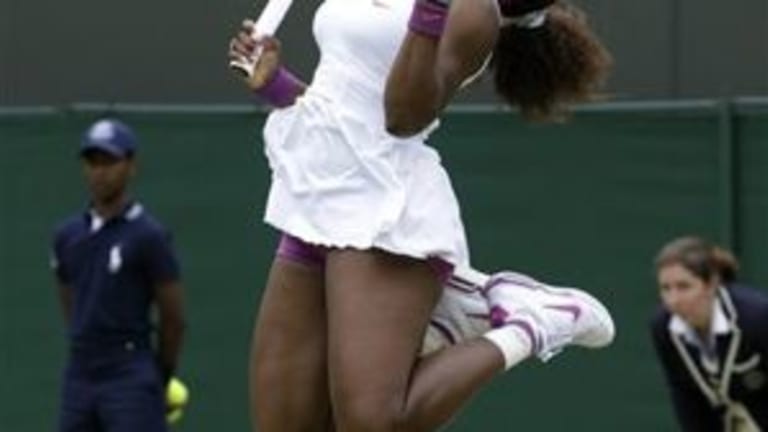We had witnessed one precipitous letdown this week, from Lukas Rosol, and it looked for a while like Yaroslava Shvedova was going to subject us to another. In her previous match, she had become the first player in Grand Slam history to record a Golden Set. Today she became the first player to win a Golden Set against one opponent, and follow it by losing a 6-1 set to another.
Of course, all opponents are not created equal. This one happened to be Serena Williams, and Shvedova seemed to know it a little too well. She failed to bring anything like her usual big-hitting, athletic game to the court in the first set. Serena, on the other hand, was more composed and purposeful than she had been in the tournament so far. She served well, moved the ball from corner to corner, and finished rallies efficiently. She was even loose enough to throw in a perfect drop volley to close out one point late in the set.
The change came when Shvedova held to open the second set, and began to find her range in the process. Serena must have felt the shift as well, because by 1-1 she wasn’t the same loose and purposeful player she had been a few minutes earlier. Her ground strokes were tighter now. Despite two double faults from the Kazakh in that game, Serena was unable to break.
For the rest of the set, and much of the match, it was Shvedova who did the dictating. She was committed, as you must be when you’re playing a decently in-form Serena Williams, to going after every chance she had of putting the ball away. Rarely do you see someone go toe to toe with Serena and match her power and placement from the baseline, but for the better part of two sets, Shvedova managed it. Her risks did lead to misfires—Shvedova hit seven aces but double-faulted six times; cracked 24 winners but committed 20 errors. The important thing was that she played on her terms and forced Serena to come up with something special to beat her. And Serena did.
At 3-3 in the third set, Shvedova went down 0-40 on her serve before fighting her way back and holding with an ace. The momentum was with her, and Williams, who had been given a Code Violation warning for racquet abuse earlier, was visibly frustrated—her early calm was long gone. With Shvedova lighting it up from the ground and making athletic plays all over the court—her mother was a world champion ultra-marathoner—Serena needed her serve as a counterweight.
Serena held at love for 4-4, and hit two aces to hold again for 5-5. That one shot, her famous serve, was enough to turn the momentum back toward her in time. At 5-5, Shvedova, with some of her spark extinguished, double-faulted twice and was broken. Serving for the match, Serena still wasn’t loose, but she managed to get a crucial forehand to drop on the line at 15-30, sent up a backhand lob that Shvedova misjudged at 30-30, and closed the match with a determined backhand that Shvedova couldn't handle.
Serena’s stats were good: 12 aces, and 35 winners against 13 unforced errors. She was only broken twice. Yet she’s not killing people at the moment—she beat No. 33 Jie Zheng 9-7 in the third set, and now No. 65 Yaroslava Shvedova 6-1, 2-6, 7-5. Williams says she knows she can play “soooooo much better,” and she’ll probably need to in her next match, against No. 4 Petra Kvitova. That’s one we’ve been waiting to see. Kvitova is the defending champion. Serena is the last woman to beat her here.
